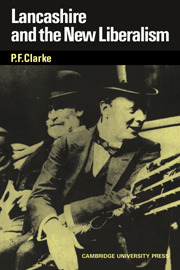Book contents
- Frontmatter
- Contents
- Preface
- Abbreviations
- Dedication
- PART ONE INTRODUCTION
- PART TWO FORMATIVE INFLUENCES
- PART THREE THE TERMS OF THE CONTEST
- PART FOUR THE RECONSTITUTION OF LIBERAL LANCASHIRE
- PART FIVE FIELDS OF RECRUITMENT
- PART SIX GOING TO THE COUNTRY
- 13 The core of the argument
- 14 Vox populi
- PART SEVEN CONCLUSION
- APPENDICES
- Bibliography
- Index
13 - The core of the argument
Published online by Cambridge University Press: 23 November 2009
- Frontmatter
- Contents
- Preface
- Abbreviations
- Dedication
- PART ONE INTRODUCTION
- PART TWO FORMATIVE INFLUENCES
- PART THREE THE TERMS OF THE CONTEST
- PART FOUR THE RECONSTITUTION OF LIBERAL LANCASHIRE
- PART FIVE FIELDS OF RECRUITMENT
- PART SIX GOING TO THE COUNTRY
- 13 The core of the argument
- 14 Vox populi
- PART SEVEN CONCLUSION
- APPENDICES
- Bibliography
- Index
Summary
As far as I can make out every argument used in attack and in defence has its separate and independent effect. They hardly ever meet, even if they are brought to bear upon the same mind.
Quoted by Graham Wallas, 1908The rhetoric of election campaigns cannot be taken at face value but it was rather more than the hunt for a ‘cry’. The argument was about power. To some extent the politicians were asking for support on their own terms: and to some extent they were seeking votes on any terms. The ‘issues’ of an election reflect this tension. Some were articulated by powerful sectional forces (albeit in terms of what was feasible under party government); and some were articulated by the politicians (albeit in terms of what was palatable to the electorate). Some issues were argued out in the country and others were merely referred to (by and large it was the sectional issues which were taken as read). At the turn of the century no-one spent much time in exploring the merits of Home Rule, or of temperance reform, or of religious education, which is not to say that they were unimportant in influencing votes. The politically creative argument, on the other hand, centred on other issues of government which were in a real sense taken to the people by the politicians. It was the running debate over these which defined the grounds upon which the parties asked for power. These issues, moreover, were more clearly associated with particular leaders; men as well as measures were to be weighed in the balance.
- Type
- Chapter
- Information
- Lancashire and the New Liberalism , pp. 343 - 364Publisher: Cambridge University PressPrint publication year: 1971



